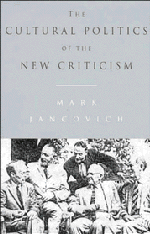Book contents
- Frontmatter
- Contents
- Preface
- List of abbreviations
- Part I The New Criticism and its critics
- Part II The formation of the New Criticism
- Part III The establishment of the New Criticism
- Part IV The development of the New Criticism
- Conclusion: Modernism and postmodernism within the American academy
- Introduction
- 13 The professionalization of literary study
- 14 The New Critical intervention
- 15 Cultural criticism and postmodernity
- Conclusion
- Notes
- Bibliography
- Index
14 - The New Critical intervention
Published online by Cambridge University Press: 18 December 2009
- Frontmatter
- Contents
- Preface
- List of abbreviations
- Part I The New Criticism and its critics
- Part II The formation of the New Criticism
- Part III The establishment of the New Criticism
- Part IV The development of the New Criticism
- Conclusion: Modernism and postmodernism within the American academy
- Introduction
- 13 The professionalization of literary study
- 14 The New Critical intervention
- 15 Cultural criticism and postmodernity
- Conclusion
- Notes
- Bibliography
- Index
Summary
It was this very problem which the New Critics addressed through a critique of scientific positivism in general, and literary scholarship in particular; a critique which challenged the division between the public and the private on which these forms of positivism were based. In his article, ‘Miss Emily and the Bibliographer’, for example, Tate countered the scholars by attacking the very definition of ‘criticism as an affair of subjective impressions opposed to certifiable facts’. His objection was that this position limits the study of literature to the accumulation of historical information. The study of literary texts, he argued, could have little validity so long as reading was defined merely as a matter of the subjective response of individuals. The concentration on the text as a linguistic construct was offered as a basis for assessing the validity and significance of specific readings. The attempt to identify the objectivity of the text was, at least in part, a way of overcoming the philologists' division between the objectivity of the historical background and the subjectivity of the reader's response. This concentration on the literary text as a linguistic process of production allowed Tate to distinguish the literary text from its background. He argued that it was not the text which had no meaning except as a transparent expression of its historical background, but that its background only had meaning for literary study in so far as it informed the process of literary production. Defining the literary process of production as a linguistic process also allowed Tate to define a basis for the evaluation of responses to literary texts.
- Type
- Chapter
- Information
- The Cultural Politics of the New Criticism , pp. 141 - 145Publisher: Cambridge University PressPrint publication year: 1993



